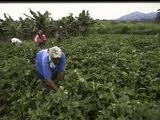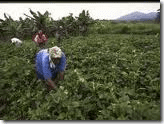CLIMATE change remains a critical issue especially for least developed countries which have proved to be the most vulnerable since they have the least capacity to adapt.
Among many other challenges, farmers are grappling with floods and inconsistent weather patterns that have affected rainfall in most parts of the Southern African region where agriculture forms the backbone of the national economies.
Documented research shows that agricultural activities contribute about 10 to 12 per cent to climate change. However, it has been observed that organic farming can be part of the solution to climate change and offers significant scope for climate change adaptation.
Organic farming is also said to use less energy, with a lesser impact on the environment.
According to Donald Zulu, an agro-forestry specialist and programmes manager at Kasisi Agriculture
Training Centre, sustainable organic farming is a way of farming that aims to achieve long-term sustained production and productivity that involves using practices that are ecologically or environmentally friendly. Mr Zulu said some of the practices include green manures, fertiliser trees, compost and animal manure and minimum tillage through planting basins and ripped lines.
He also describes climate change as a change of climate which is attributed directly or indirectly to human activity that alters the composition of the global atmosphere and which is in addition to natural climate variability observed over comparable time periods.
Human activities undertaken without consideration for the environment are substantially increasing the concentration of the green house gases and resulting into climate change.
Mr Zulu said significant climate change is expected over the 21st Century which will continue to affect the ecosystem’s ability to provide basic needs for food, water, timber, fibre and fuel which will diminish.
Regions with low adaptive capacity due to poverty, lack of infrastructure, services and appropriate governance will be most severely affected.
As for sub-Saharan Africa and Zambia in particular, due to its low economic development and diversity of local conditions ,it is one region that needs special attention in developing adaptation and mitigation strategies, a situation Mr Zulu describes as crucial for the agriculture sector which greatly relies on rain.
Climate change has not spared organic farmers, though. Mr Zulu said it is envisaged that climate change will continue bringing severe weather extremes especially in form of droughts and floods in Africa and Zambia in particular would continue to have significant consequences on food production and food security.
He said climate change would, therefore, impact negatively on all rain-fed dependant agriculture systems in Zambia. However, Mr Zulu said the good news is that sustainable agricultural systems like organic farming are better poised to withstand the wrath of climate change.
He said sustainable organic agricultural practices involving green manures, fertiliser trees and shrubs, compost and animal manures and minimum tillage all offer climate change adaptation and mitigation measures which are key to ensuring sustainable food production in the face of climate change especially among smallholder farmers .
Mr Zulu highlighted three key adaptation measures such as the use of locally adapted seed types and varieties (traditional or local seeds), the increase in soil organic matter, which is crucial in enhancing soil water retention, and minimum tillage practices, which help in rain water harvesting.
He explains that traditional or local seed varieties like Gankanta are able to withstand limited moisture. Soils rich in organic matter help in soil moisture retention especially in times of long drought spells while minimum tillage practices help in rain water harvesting.
Increasing soil organic matter and minimum tillage practices also offers crucial climate change mitigation strategies by sequestering carbon through organic matter input and not exposing the soil to the atmosphere.
Sustainable organic farming is, therefore, part of the solution to climate change and offers clear strategies of adapting to climate change.
Sustainable organic agriculture is said to have much to offer in both mitigation of climate change through the emphasis on closed nutrient circles and is particularly resilient.
As for Kasisi Agriculture Training Centre, Mr Zulu said the centre has mainstreamed climate change in the sustainable organic farming training and promotion effort.
He said the centre employs pragmatic and appropriate training and extension strategies involving rigorous on-farm and on-station training, farm visits, radio programmes, demonstrations, field days and motivational exchange visits.
Sustainable organic farming is being promoted to smallholder farmers as a sustainable way of producing food and fibre while offering vital climate change adaptation strategies. It is part of the solution to climate change as it offers crucial climate change mitigation strategies through carbon sequestration.
And Khama Mbewe, director of Lumuno Foods, the producers of organically-grown spices and processed chillies, said organic farming provides one of the best produce.
He was speaking at the just- ended Zambia International Trade Fair in Ndola at which Lumuno Foods, a Chongwe-based company, participated.
Mr Mbewe said with organic farming no synthetic pesticides are used to kill the pests that attack crops but some spices such as Oregana and Marygold are used in the control of pests as they assist organic farmers to have crops such as vegetables not to be attacked as the pests would feed on the spices as pest attractants that are grown together with the vegetables.
He said intercropping in organic farming such as growing of maize, groundnuts and beans is important as it has proved to improve soil fertility.
According to Mr Mbewe organic products help improve people’s lives because of their rich nutrients.
He said more needs to done on marketing organic products as consumers are not aware about which products are categorised as organic when they are buying from markets and supermarkets as all products are usually mixed. Mr Mbewe said as an organic farmer he has not been spared by the effects of climate change.
He said in Kasisi this winter season has been extremely cold and crops such as bananas have been affected.
He said farmers practising the conventional way of farming had partly contributed to climate change as eventually they require more chemicals for fertiliser, thus leading to further contamination of the environment.
In order to combat the effects of climate change, sustainable agriculture through organic farming should be promoted, particularly among small-scale farmers that have been identified to have little or no knowledge on climate change.


Deprecated: strpos(): Passing null to parameter #1 ($haystack) of type string is deprecated in /home/agriviek8Qv/agriviet.net/public_html/wp-includes/comment-template.php on line 2522